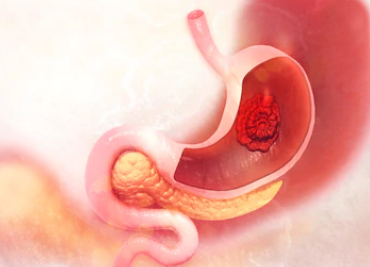 Stomach cancer is a malignant tumor originating from the epithelium of the stomach mucosa. The most common pathological type is adenocarcinoma. The 5-year survival rate for early stomach cancer after surgery exceeds 90%, however, advanced stomach cancer still lacks effective treatment. Statistics show that the global incidence of stomach cancer ranks fifth among malignant tumors, the mortality rate ranks third, and the incidence of men is more than twice as high as that in women. The occurrence of stomach cancer is caused by a variety of factors, among which the most common causes include Helicobacter pylori infection, precancerous lesions, genetic factors, environmental and dietary factors, etc.
Stomach cancer is a malignant tumor originating from the epithelium of the stomach mucosa. The most common pathological type is adenocarcinoma. The 5-year survival rate for early stomach cancer after surgery exceeds 90%, however, advanced stomach cancer still lacks effective treatment. Statistics show that the global incidence of stomach cancer ranks fifth among malignant tumors, the mortality rate ranks third, and the incidence of men is more than twice as high as that in women. The occurrence of stomach cancer is caused by a variety of factors, among which the most common causes include Helicobacter pylori infection, precancerous lesions, genetic factors, environmental and dietary factors, etc.
Diagnosis of Stomach Cancer
Related diagnostic methods for stomach cancer are:
- Gastroscopy and stomach histopathological biopsy. They are currently the most authoritative diagnostic method, among which stomach histopathological biopsy is the gold standard for stomach cancer diagnosis. This examination can be divided into early stomach cancer examination and advanced stomach cancer examination.
- Three items of early stomach cancer. It is a non-invasive, safe and economical inspection method, including PGⅠ, PGⅡ, and G-17 detection. These are the three substances secreted by the stomach glands, which mainly reflect the atrophy of the stomach and help the hierarchical management of stomach cancer risk It is convenient for early prevention and treatment of stomach cancer.
- Serum tumor markers. Carcinoembryonic antigen CEA, cancer antigen CA19-9, CA724, CA125, GKN2, etc., have certain clinical significance for the diagnosis of stomach cancer and postoperative disease monitoring. If stomach cancer has liver metastasis, alpha-fetoprotein may increase in varying degrees.
- Blood and stool routine examination. Anemia is often seen in patients with stomach cancer. If it is accompanied by melena or a positive fecal occult blood test, it indicates that there is active bleeding and timely hemostasis is required.
- Imaging diagnosis. Include X barium meal examination, ultrasound gastroscopy, CT, MRI, and PET-CT examination, etc.
Advantages of Our Products
Creative Biogene's stomach cancer diagnostic product is mainly a polyclonal antibody GKN2. Gastrokine-2 is a recognized stomach cancer-specific tumor suppressor gene, and its deletion has been confirmed to be involved in the occurrence and development of stomach cancer. The low expression level of GKN2 has a high diagnostic value of stomach cancer. Our stomach cancer diagnostic products have excellent performance in sensitivity, specificity and accuracy.
Creative Biogene is an expert in the field of stomach cancer diagnosis. It is sincerely looking forward to cooperating with you and providing you the best quality product with all of our hearts!
Please contact us for more details.
Reference
- Hasan A., et al. (2015). "Down-regulated gene expression of GKN1 and GKN2 as diagnostic markers for gastric cancer." International Journal of Medical and Health Sciences. 9.6: 532-535.
For research use only. Not for any other purpose.
 Stomach cancer is a malignant tumor originating from the epithelium of the stomach mucosa. The most common pathological type is adenocarcinoma. The 5-year survival rate for early stomach cancer after surgery exceeds 90%, however, advanced stomach cancer still lacks effective treatment. Statistics show that the global incidence of stomach cancer ranks fifth among malignant tumors, the mortality rate ranks third, and the incidence of men is more than twice as high as that in women. The occurrence of stomach cancer is caused by a variety of factors, among which the most common causes include Helicobacter pylori infection, precancerous lesions, genetic factors, environmental and dietary factors, etc.
Stomach cancer is a malignant tumor originating from the epithelium of the stomach mucosa. The most common pathological type is adenocarcinoma. The 5-year survival rate for early stomach cancer after surgery exceeds 90%, however, advanced stomach cancer still lacks effective treatment. Statistics show that the global incidence of stomach cancer ranks fifth among malignant tumors, the mortality rate ranks third, and the incidence of men is more than twice as high as that in women. The occurrence of stomach cancer is caused by a variety of factors, among which the most common causes include Helicobacter pylori infection, precancerous lesions, genetic factors, environmental and dietary factors, etc.